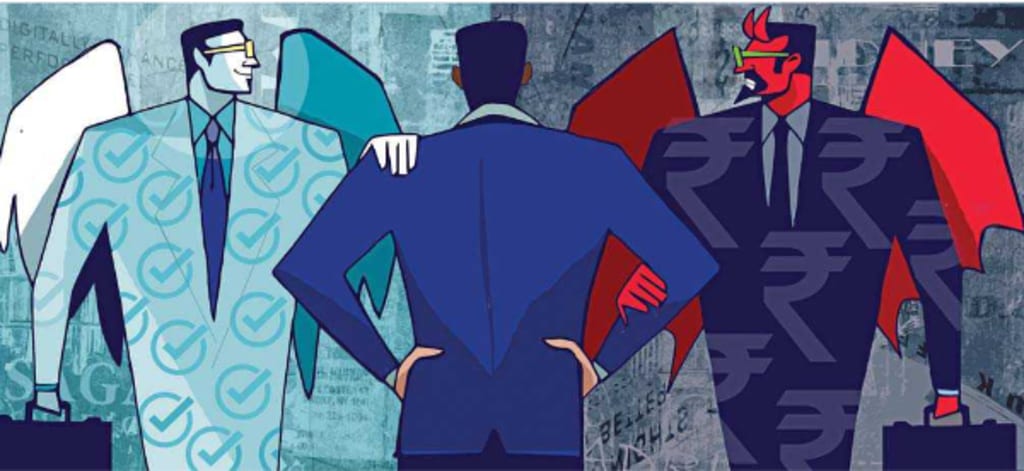Rethinking Business Ethics
The rapid pace of change in the business landscape is a clarion call to see business ethics in an all-new light. Real-world issues are bleeding into company manifestos as organizations are slowly shaking off the mantle of profit over all' in favor of good for all'. But real change can only take root when businesses understand their true purpose and who they are creating value for.

We have quietly experienced an almost perfect storm in thinking about business. The Global Financial Crisis (GFC), combined with the emergence of issues such as growing inequality, global warming, and rapid technological change have overloaded the traditional model of business. Such a traditional view focuses mainly on money, profits, and shareholders. And, it turns phrases such as 'business ethics' into a joke. The standard narrative can no longer keep up with the changes that are going on in the world, and there is an increasing need for changes in the very nature of how we understand business.
Indeed, we are on the edge of a revolutionary shift in the fundamentals of business. And, ethics and morality are at the center of this shift. This shift is going on all over the world, and it will require a new set of skills to be successful. It requires executives and business thinkers to consider purpose as well as profits, stakeholders as well as shareholders, and to see business as an integral part of a healthy growing society.
All around the world, there is a growing demand that businesses pay attention to ethical and societal issues. Whether the concern is economic inequality often symbolized by CEO pay, or opportunity inequality for those who have been left out of the capitalist system, or how particular businesses have helped or harmed society, business today is about more than just the money. Rather than focus solely on making profits for shareholders, business models in the 21st century need to understand how the interests of customers, suppliers, employees, communities, and financiers (including shareholders) are connected to each other. And, to avoid the trap of simply responding to societal pressures, they must focus on their reason for existing, their purpose.
We see tremendous movements in the real business world towards these ideas. Now models such as conscious capitalism, inclusive capitalism, social entrepreneurship JUST Capital, and others have all contributed to the idea that capitalism must be reimagined to be more stakeholder-oriented. In the US, Business Roundtable has issued a statement saying that the stakeholder model is a better way to understand business than the old shareholder primacy model. Similarly in Europe, the World Economic Forum has issued a stakeholder capitalism manifesto for its 2020 meetings. Traditional companies such as Unilever have moved to rediscover their purpose. And, we have soon the emergence of new companies, such as SalesForce, built on principles of purpose and stakeholders. Thousands of young entrepreneurs are starting companies with the aim of both making money and changing the world for the better.
In addition to these large-scale societal shifts and demands for a more responsible capitalism, new companies and technology have shed new light on traditional business othics issues. There is literally no place for a company to hide in today's connected world. Almost everything that a company does is open for scrutiny by its stakeholders around the world. Many traditional companies are scrambling to deal with such transparency. Great companies are busy engaging their stakeholders in meaningful and value-creating relationships. And, even more difficult issues are on the horizon. Given the rapidity of technological change we may experience a generation gap in the very way we think about ethics in business.
For instance, one concern is job loss to automation. Different projections predict that anywhere between 20 and 800 million jobs will be lost to automation by 2030. This may be great for efficiency and companies' bottom line, but what happens to all those people who are pushed out? What does the 48-year-old truck driver who has spent the last 25 years behind the wheel do to pay his bills and support his family? The latest generation can prepare for the future. They can understand where automation shifts are going to be coming and prepare by studying and acquiring skills that will simply never be automated efficiently. But can we really expect someone who loses their livelihood at a more advanced age to go back to school, learn a new skill or trade, and restart a new career? And who supports their family while they do all this? The real question becomes what ethical responsibility does the company that they worked for 25 years have now that technology has made their skills irrelevant? What is the role of government? Are there public-private partnerships that can help alleviate these issues?
Privacy is another issue that can illustrate the growing generation gap. Children growing up today do not have the same illusions about it as their parents and grandparents. An Orwellian 1984 style world is incredibly scary to older generations, but it is just par for the course and expected by the youth of today. Google, Amazon, and Facebook already use targeted advertising based on your search history, so what happens when they have even more access to your life? When it gets to a level that you are shown ads for things you have not even thought about, ads which are just based on your mood and thoughts. Where do you draw that line as a company? Does the value of a more efficient service and product negate the value of privacy and does that change as the idea of privacy changes and eventually becomes non-existent? Should government regulate these issues? Will that stifle innovation?
There is no end to the ethics issues today in business. For a long time, we could pretend that business ethics was a joke. We do not have that luxury today. As technology advances rapidly, and as we enter a world where there are self-driving cars, factories run by Al, life-extending technologies that are expensive, and increasing genetic knowledge, we need to put business and ethics together. Businesses have to start by understanding their purpose and who they are creating value for their stakeholders), as well as how they contribute to society. We can be the generation that makes business and capitalism better and more responsible.
Read Our Article : Every Parent Should Ask – What Your Child Read And Learn Today?
About the Creator
Gobookmart
Visit: https://gobookmart.com
Enjoyed the story? Support the Creator.
Subscribe for free to receive all their stories in your feed. You could also pledge your support or give them a one-off tip, letting them know you appreciate their work.






Comments
There are no comments for this story
Be the first to respond and start the conversation.